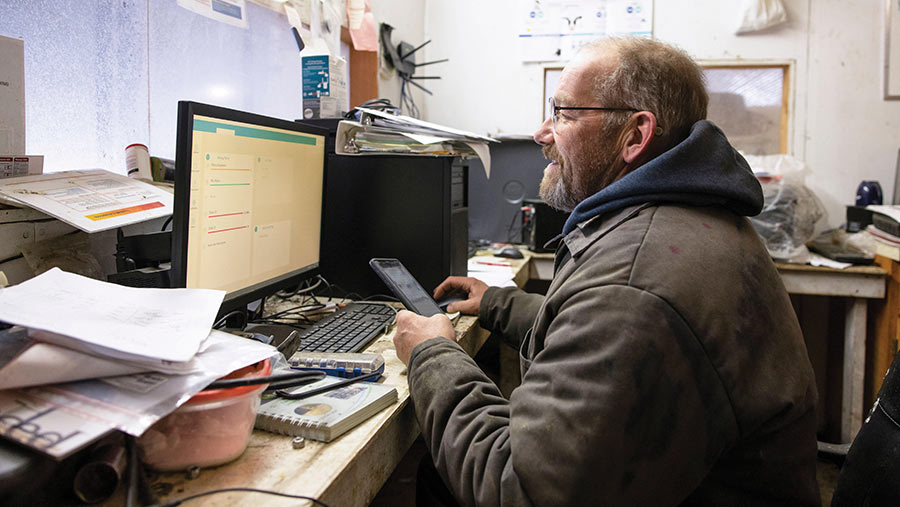Red tape burden increases for farmers, survey shows
 © Hero Images Inc/Alamy Stock Photo
© Hero Images Inc/Alamy Stock Photo Paperwork linked to farm assurance schemes, regulatory bodies and supply contracts is keeping some farmers in the office for more than 15 hours a week, with a new survey showing that the time and cost burdens of administration are increasing.
That survey, by farm management software provider Sum-IT, shows that the number of hours farmers commit to administration has increased in the past three years, although the findings don’t appear to identify Brexit as a reason.
See also: How to save time, stress and cash in farm office routines
However, greater compliance demands in different sectors – for example, the extensive crop production record-keeping now required from arable growers – is pushing up the workload.
Dairy farmers seem to be the hardest hit, with 86% of 242 British farmers surveyed reporting an increase in farm administration, due in part to the expectations of milk buyers.
The phasing out of the Basic Payment Scheme in England, with the requirement for more paperwork to qualify for various stewardship schemes, is another factor.
Compliance
The most time-consuming tasks seem to be associated with assurance scheme compliance – 63% of dairy farmers said this accounted for the highest proportion of their office work – and with regulatory compliance, such as the requirements of HMRC and the British Cattle Movement Service.
Invoicing, creditor and debtor management, financial planning and payroll also take time to administer.
What is telling is that the majority of farmers don’t share the admin workload with others: only 16% said they used a farm secretary. For small businesses in other sectors this figure sits at 46%.
Lynn Briggs, council chairwoman of the Institute of Agricultural Secretaries and Administrators (IAgSA), said concerns about confidentiality might be a reason why some farmers resist bringing in someone outside the family to help.
“There can be a lot of secrecy in a farming businesses because it is predominately a family business and there is a distrust of outsiders,” she added.
For that reason, many agricultural secretaries don’t work in their local area where they are more likely to know the farmer they are employed by.
Fresh blood
Although the survey authors suggest that a shortage of agricultural secretaries could be a factor, Ms Briggs said that while this situation might once have existed, it had since been addressed.
IAgSA membership numbers are relatively stable, but the average age of secretaries is increasing.
Those who might have studied a secretarial course when most agricultural colleges ran these are now in their fifties and, as those courses no longer exist, it has been a challenge to get fresh blood into the industry.
Since the pandemic, the IAgSA has updated its training programme, which has been in existence for more than 10 years, to a streamlined online format with pre-work assessments prior to joining a virtual classroom.
“This has proved to be extremely successful, attracting individuals who are looking for a career change from other professions, or who want to upgrade their current skill set,” said Ms Briggs.
Digitisation
While some farmers might be resistant to employing a farm secretary, the majority are embracing digitisation.
Most of the farmers surveyed said 90% of their admin is now in digital format, perhaps due in part to the launch of HMRC’s Making Tax Digital initiative in April 2022; only 7% of respondents had less than half of their admin digitised.
Many of the farmers surveyed, from small to large operators, confessed to a lack of certainty about their legal obligations against a backdrop of new legislation applying to exports to the EU, environmental stewardship, and the employment of migrant workers.
Only 36% said they were confident they understood their legal requirements, 16% said they did not understand as much as they should, and 1% admitted to having no understanding at all. n
What else the survey revealed
The survey asked farmers in what direction they planned to take their business in the next five years.
Only 34% said they are planning expansion, 48% are seeking to maintain the status quo, 5% intend to downsize and 2% plan to sell their farm.
When asked about the future of their businesses, 40% said they were worried, with arable and sheep farmers and those aged over 45 expressing the greatest concern.
Many responses showed apprehension about government policy and frustrations around finding suitable employees.
But the younger generation was slightly more optimistic – 44% of respondents said they were excited about the future, compared with just 20% of older participants.
See the full results of the SUM-IT’s Farmer Insights Survey 2023.
